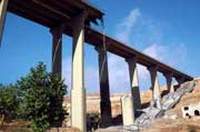Russia sends cheapest ‘peacemakers’ to Lebanon at their own risk
Russia’s Federation Council approved the sending of a technical battalion to Lebanon Tuesday. The decision will let Russian military men start reconstructing bridges and roads in Lebanon destroyed by the Israeli Air Force. The Kremlin believes that it is the most efficient form of assistance that Russia could render the war-torn country. The first group of Russian military men will arrive in Lebanon in the beginning of October. It is worthy of note that the Russian servicemen participating in the reconstruction of Lebanon will not possess the peacemakers’ status. In addition, the Russian soldiers in Lebanon will not be protected with UN’s immunity.

“There can be many variants for the Russian Armed Forces to be present in Lebanon, but I think that our servicemen could help reconstruct the infrastructure of Lebanon that was severely damaged during the armed conflict with Israel,” Russian Minister for Defense Sergei Ivanov said. “We have special non-combatant groups that deal with the reconstruction of damaged infrastructure,” the official added.
Lebanon suffered four billion dollars of damage during the war. The country urgently needs to recreate its roads, water supplies, bridges and many other objects of infrastructure. About 15,000 buildings, 107 bridges, 136 highways have been destroyed in Lebanon. Specialists say that Russian military men will have to clear Lebanon of mines before they could start rebuilding bridges and roads.
According to the United Nation Mine Action Service, Israeli Air Force and artillery attacked not less than 390 objects in the south of Lebanon with the use of cluster bombs. Up to 70 percent of mines did not detonate during the raids. UNMAS employees have destroyed over 2,000 Israeli live bombs in the area, but there are too many of them left on the territory anyway.
Israeli officials said that there was over 1,800 cluster bombs used during the raids. The bombs contained over 1.2 million items of subammunition. The undetonated mines left after the cessation of warfare have already killed 12 Lebanese citizens.
Multiple Launch Rocket System, or MLRS, is one of the main kinds of weaponry that uses cluster bombs. The system fires 227-millimeter shells at a distance of up to 32 kilometers. The shells are not outfitted with guidance systems. The inefficient precision of the MLRS is compensated with heavy volley fired on one target.
Russian military men have a unique experience in clearing territories of mines. Soviet sappers were working in Algeria in the 1960s when the French troops left the country. The servicemen were searching for mines in unbearably hot weather when daytime temperatures reached 50 or 60 degrees Centigrade. The Soviet soldiers destroyed 1.5 million bombs. Soviet soldiers and officers found 200,000 US mines in Laos. Russian field engineers worked in Abkhazia, Kosovo, Sudan and East Timor in the 1990s too.
It is worthy of note that sappers receive very good money for their work. For example, it was Switzerland that paid the work of Russian sappers in Kosovo. For the time being it is not clear who is going to pay for the work of Russian specialists in Lebanon. The European Union has already allocated several millions of euros to Lebanon for recreation works.
Russian military men will live in a comfortable tent camp in Lebanon. The camp will have its own food, cooks and cooking equipment. The government of Russia will cover all the costs (about 505 million rubles) connected with Russian sappers’ stay in Lebanon.
The Russian battalion will be sent to Lebanon on the base of a bilateral agreement with the Lebanese government. It means that Russian servicemen will not possess the status of peacemakers and will not be able to use international rights protecting peacemakers against possible risks of their staying in hotspots of the world.
Strana
Translated by Dmitry Sudakov
Pravda.ru
Subscribe to Pravda.Ru Telegram channel, Facebook, RSS!




